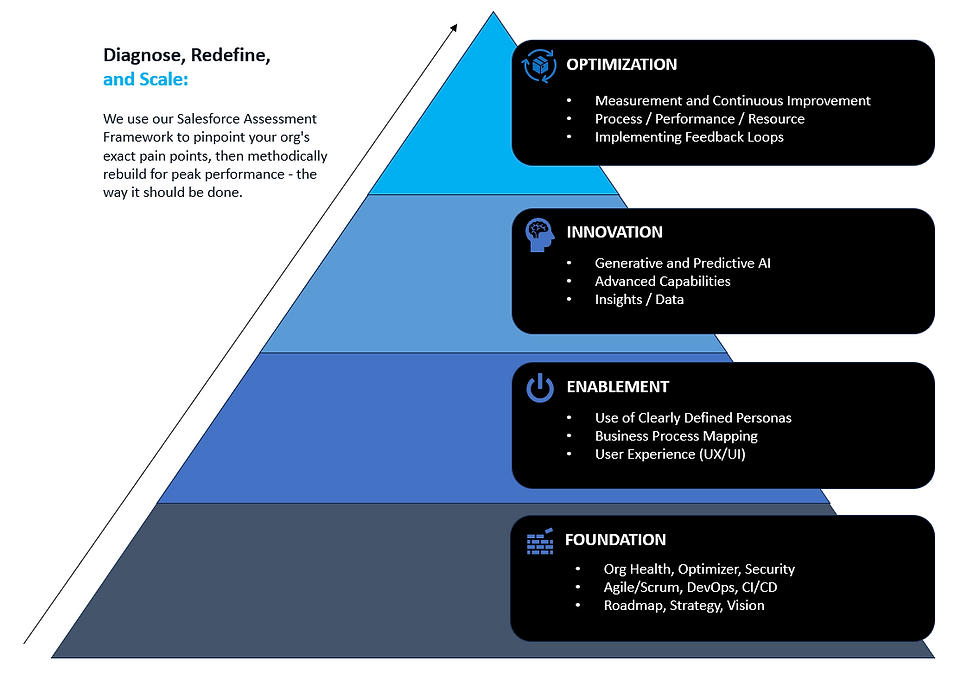3 Costly Mistakes Sabotaging Your SMB's Salesforce Implementation (and How to Avoid Them)
- Jon Ewoniuk
- Feb 23, 2024
- 3 min read
Implementing Salesforce can be a game-changer for small and medium-sized businesses (SMBs). It promises streamlined processes, improved customer relationships, and ultimately, boosted sales.
However, many SMBs fall victim to common pitfalls that hinder their CRM's effectiveness and leave them feeling frustrated and disappointed.
Here are the top 3 mistakes SMBs make when implementing Salesforce, and how to avoid them:
Mistake 1: Ignoring User Adoption
Imagine: You hire a talented salesperson, but they hate their job. They find the company software clunky and confusing, leading to inefficiency and low morale. This scenario mirrors what happens when you force your team to use a confusing Salesforce without proper training and support.
The Solution:
Prioritize user adoption: Invest in comprehensive training that goes beyond basic functionality.
Focus on user experience: Make Salesforce user-friendly and intuitive.
Gather feedback: Encourage your team to share their experiences and concerns.
Recognize and reward engagement: Celebrate success stories and incentivize continued use.
By prioritizing user adoption, you turn Salesforce from a burden into a weapon your team can use to achieve their goals.
Mistake 2: Over-Customization
SMBs are often tempted by "experts" who promise a custom-built Salesforce that caters to every specific need. While customization can be beneficial, over-customization can lead to a Frankenstein monster of a CRM.
The Problem:
Increased complexity: Overly customized systems become difficult to manage and maintain.
Reduced flexibility: Customization can limit your ability to adapt to future changes in your business needs or Salesforce updates.
Hidden costs: Extensive customization can be expensive and time-consuming.
The Solution:
Start simple: Begin with a basic Salesforce setup and gradually add customizations as needed.
Focus on core functionalities: Prioritize features that address your essential business needs.
Utilize pre-built solutions: Leverage Salesforce AppExchange for pre-built solutions that address specific industry or business needs.
By taking a strategic approach to customization, you can avoid the pitfalls of over-complication and ensure your Salesforce remains flexible and manageable.
Mistake 3: Neglecting Data Hygiene
Imagine making crucial business decisions based on inaccurate information. This is the reality for many SMBs who neglect data hygiene within their Salesforce.
The Consequences:
Poor decision-making: Inaccurate data leads to flawed insights and misguided strategies.
Wasted resources: You might target the wrong audience or implement ineffective marketing campaigns based on bad data.
Missed opportunities: You might fail to identify valuable leads or lose track of existing customers due to incomplete or inaccurate data.
The Solution:
Establish data governance: Define clear data quality standards and ownership within your organization.
Implement data cleansing: Regularly clean and update your data to ensure accuracy.
Invest in data validation tools: Utilize tools to automatically identify and correct data errors.
By prioritizing data hygiene, you ensure your decisions are based on accurate information, unlocking the true potential of your Salesforce.
Beyond these three mistakes, here are some additional tips for a successful Salesforce implementation:
Set clear goals and objectives: Define what you want to achieve with Salesforce.
Get buy-in from key stakeholders: Ensure everyone understands the value proposition.
Choose the right implementation partner: Find an experienced partner who understands your specific needs.
Monitor and measure your results: Regularly track progress and adjust your strategy as needed.
By avoiding these common pitfalls and following these additional tips, you can ensure your Salesforce implementation is a success and empowers your SMB to achieve its full potential.
Need help figuring out the best approach for your business? Book a Free Call here.
By: Jon Ewoniuk
Book a Free Call here.
Jon is the Founder | Consultant at Peak360 IT. Peak360 IT helps companies solve technical, resource, and implementation challenges on the Salesforce platform. Founded in 2014, Peak360 IT is a Salesforce SI Partner that specializes in Sales Cloud, Service Cloud, Experience Cloud - and implementing custom applications and automations on the Salesforce Platform.
With our backgrounds in Software Development, Technology, and Consulting - Peak360 IT has a reputation for developing custom integrations using various technologies, such as MuleSoft, Google Apigee, and other SOA/API frameworks.



Comments